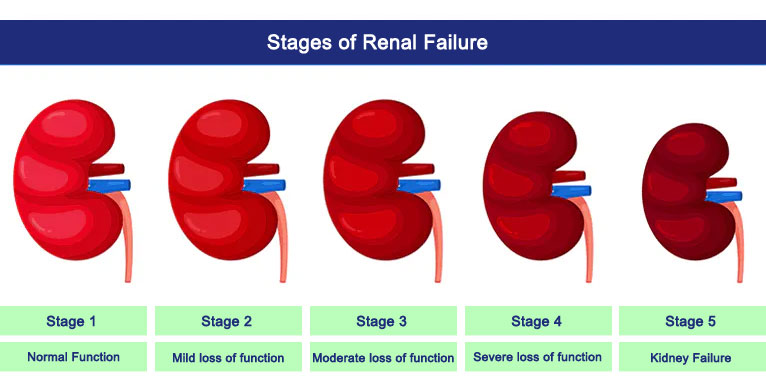Chronic Kidney Disease (CKD), also known as chronic renal disease and commonly as kidney failure, is a progressive loss in renal function over a period of months or years. The most common cause is diabetic nephropathy, followed by hypertensive nephroangiosclerosis and various primary and secondary glomerulopathies. Moreover, painkillers play a significant role. Obstructive uropathy due to nephrolithiasis and prostatic hypertrophy is common, while congenital conditions such as polycystic kidney disease (ADPKD) also lead to CKD. The normal glomerular filtration rate (GFR) is approximately 125 ml/min.

Stage I
CKD means you have a normal eGFR of 90 or greater and mild damage to your kidneys. Your kidneys are still working well, so you may not have any symptoms. You may have other signs of kidney damage, such as protein in your urine.
Stage II
CKD means your eGFR has gone down to between 60 and 89, and you have mild damage to your kidneys. Most of the time, your kidneys are still working well, so you may not have any symptoms. You may have other signs of kidney damage, such as protein in your urine or physical damage.
Stage III
CKD means you have an eGFR between 30 and 59 and mild to moderate damage to your kidneys. Your kidneys do not work as well as they should to filter waste and extra fluid out of your blood. This waste can build up in your body and begin to cause other health problems, such as high blood pressure and bone disease. You may begin to have symptoms, such as feeling weak and tired or swelling in your hands or feet.
Stage IV
CKD means you have an eGFR between 15 and 29 and moderate to severe damage to your kidneys. Your kidneys do not work as well as they should to filter waste out of your blood. This waste can build up in your body and cause other health problems, such as high blood pressure, bone disease and heart disease. You will likely have symptoms such as swelling of your hands and feet and pain in your lower back.
Stage V
CKD means you have an eGFR less than 15 and severe damage to your kidneys. Your kidneys are getting very close to failure or have already failed (stopped working). Because your kidneys have stopped working to filter waste out of your blood, waste products build up in your body, which can make you very sick and cause other health problems. When your kidneys fail, treatment options to survive include dialysis or a kidney transplant.
Treatment of Kidney Failure in Homeopathy:
Stem cells are present in the bloodstream and almost all organs of the human body. These stem cells are responsible for growth, repair, and regeneration in all organs. Stem cells are of two types:
- Embryonic Stem Cells
- Adult Stem Cells
These adult stem cells are present in the diseased kidneys of a renal failure patient. Constitutional homeopathic medicine selected on the basis of nature, temperament, personality, and individuality is given to the patient. This tailor-made medicine stimulates the adult stem cells, which brings about the repair and regeneration of injured, damaged, diseased, or inactive nephrons, which form the basic functional unit of a kidney. Thus, renal function is improved with proper elimination of creatinine, urea, and other toxic wastes from the body, normalizing urine formation. Consequently, there is a reduction in swelling and decreased dependency on dialysis. Renal transplant can also be avoided. There is no need to inject stem cells into the damaged kidney. Thus, we see that when homeopathy is used at the onset of CKD/CRI/CRF, the disease can be prevented from progressing to ESRD, saving millions in terms of lives and money worldwide. We further observed:
- Indicated homeopathic remedies reduced the number of dialysis sessions needed over time and even stopped in many cases.
- Indicated homeopathic remedies reduced and overcame the complications associated with chronic dialysis therapy.
- Indicated homeopathic remedies were helpful in postponing the urgent need for transplantation in patients waiting for a graft.
- Chronic kidney disease patients on homeopathic treatment showed marked improvement in quality of life.
- Homeopathic drugs are cost-effective and easy to use with no side effects. Renal failure patients develop a variety of psychiatric, neurological, and somatic disorders, and it was easy for the patients to overcome such conditions with constitutional homeopathic treatment.
 +91-9450630019
+91-9450630019